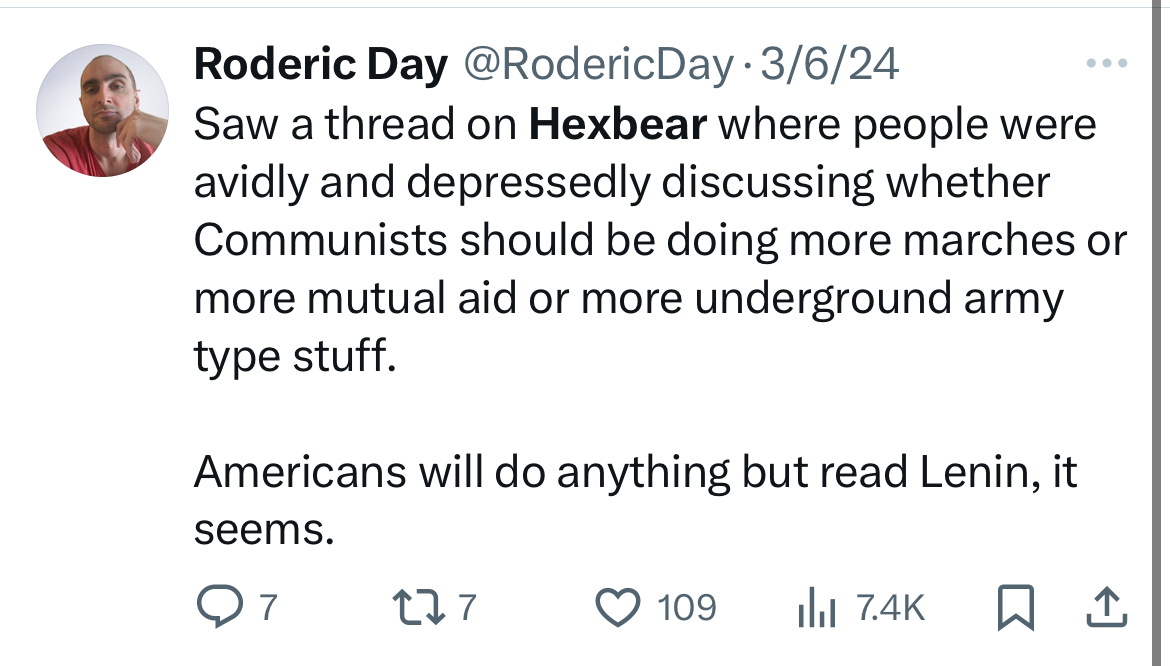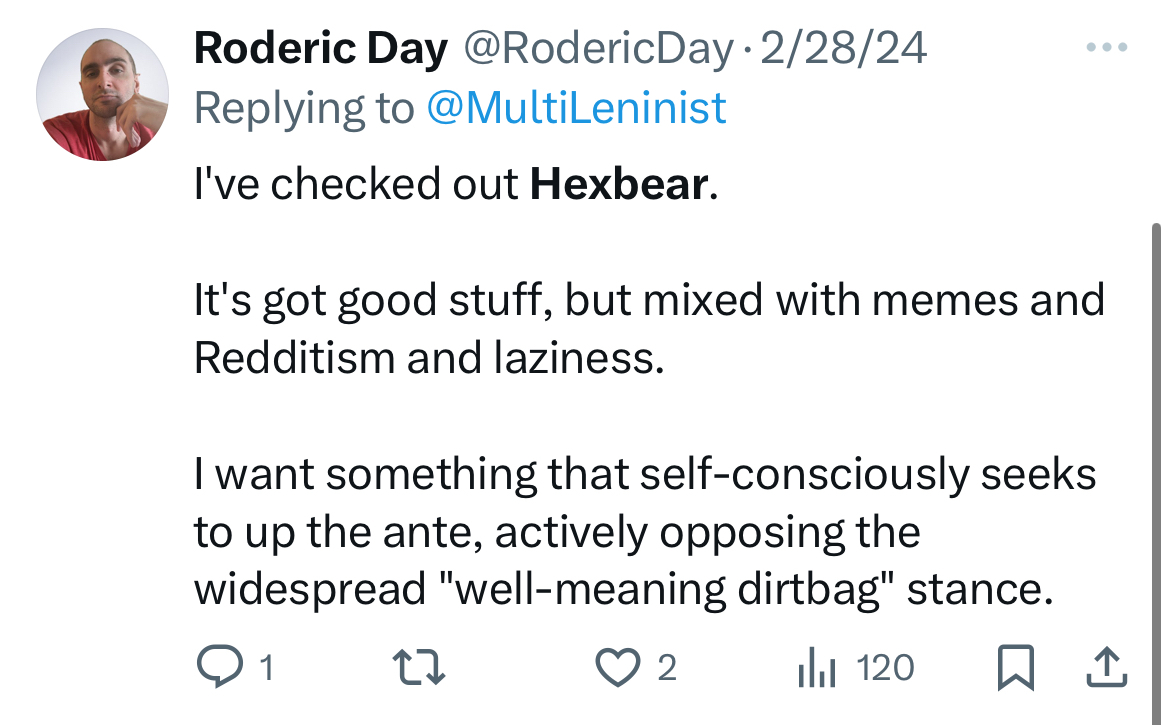cross-posted from: https://hexbear.net/post/2331989
I don’t really think he knows this site’s culture at all. No one is dissuading people from reading theory lol

Yey or ney for him?
As someone said in the post
As far as I can tell, he’s a guy who spends all his time posting about how all leftists do is post.
And this ain’t the first time, Roderick’s a bit terminally online, arguing against other based progressive like JT (Second Thought) and Michael Hudson…


The hell? I screwed up in thinking that… he may have abhored Larouchites, but I guess his economic policy and thinking is Larouchism…
He has been given a lot of space on many leftish / left adjacent platforms over the last several years which has given him a lot of credibility. I was very surprised to see Ben Norton giving him space on his channel for instance, someone I typically trust more than the majority of other influencers/journalists.
MH is very good at explaining how things currently work and why. I don’t think he can be ignored for that because there aren’t many who can or are willing to share his insights. That might be why he gets airtime. He does allude to being a Trotskyist. And he clearly knows Marx. But I’ve never really heard him say anything that I’d consider to be Marxist in terms of what comes next or how we get there. I always thought he was a bit vague on that but I haven’t read all his works.
I’m reading Capital right now, and it does not sound like he’s read it. Shouldn’t he know about TRPF, the origin of value, and the inherent contradictions (not someone managing it wrong) of capitalism? It doesn’t sound like he does.
I’m unsure what you’ve read or heard that gives the impression that MH doesn’t know about those things.
I don’t see how he could reach some of his conclusions without having understood Marx. You’ve got to remember that there’s a lot that people can take from Marx, and there are fierce differences of opinion within the tradition.
And there’s a way of writing that doesn’t use the jargon. I’d argue that approach can be a more effective way of communicating to a wider audience in many cases. Maybe that’s where your critique is coming from?
My critique comes from hearing him say silly social-democratic things on the Geopolitical Economy Report. Also, arguing with Day. Look at this if you haven’t: https://lemmygrad.ml/post/2680725 https://hexbear.net/post/1826437
We had an exchange in that top thread. I’m still unconvinced. A useful exercise would be to consider the extent to which Hudson’s work displays an understanding and application of Marxism, rather than focusing on what he gets wrong, if anything.
It seems to need that there’s a purity thing going on here, criticising MH for not doing XYZ when the real question is, okay, ‘To what extent are his economic analyses correct/accurate?’
It’s a leap to go from MH misunderstands Marx, to MH isn’t a Marxist, to MH hasn’t read Marx.
The second thread leaves me leaning towards my original position. That MH broadly knows what he’s talking about and has clearly read Marx. I’m fairly sure that MH could go through Day’s work and find faults based on his perspective; in the same way as Day can go through MH’s work and find faults based on his perspective. But we couldn’t conclude that Day hasn’t read Marx just because MH would say he’s weak on this or that aspect of Marx/ism. Day is generally good and I love redsails but he’s not a final authority.
We all have to focus on something when we talk or write, which means deciding what to leave out. We all take different things from texts, too. It’s a bit futile to conclude that someone else is wrong or hasn’t understood something/anything just because they emphasise something different in an article or talk or take something different from a text than someone else.
Even some great Marxists have erred, spotted their errors, and changed their views. Including Marx and Engels. A more recent pair is Hindess and Hurst, who followed up a strong tract with an ‘auto-critique’. Some go the other way, like Kautsky. It’s dangerous territory to proclaim that someone isn’t a Marxist or hasn’t even read Marx on the basis of one-sided criticisms that emphasise errors or slips of which the writer/speaker may be aware. At the very least, we need to hear from the other side.
As for MH advocating reforms to reverse imperialism and return to industrial capitalism, I don’t necessarily see it. There’s another viable interpretation if you begin with the premise that MH knows Marx. Something like, for domestic progress to be made in the US, the US is going to have to retreat from neoliberal finance capitalism and move through a reindustrialisation phase under a socialist government as in China. Unless he’s explicitly ruling out socialist governance, I see no reason to conclude that he must misunderstand the historical chronology.
I also don’t see the issue with framing neoliberalism as a choice. There are a lot of factors that go in to making that choice, and there are myriad decision-makers. But it’s not inevitable. If it’s not a choice, the implication is that socialists may as well not bother fighting for a different future.
Advocating for a political economy with a better balance of industry/finance does not imply a belief that it’s possible by flicking a switch like turning on a light. From what I’ve seen, I have no reason to believe that MH is a light-switcher.
Again, maybe I’m missing something, but I wouldn’t be confident in claiming that MH thinks reindustrialisation is possible in the US as the US is currently constituted. I would give him more credit and assume he knows that shifting to a Chinese-style political economy entails massive change.
I encourage you to listen to his geopolitical hours with a critical lense. I have found great errors in the past ones, but I decided to listen to the recent interview with Jill Stein. He seems to think Stein actually has a chance of winning the election with the dissimilarity of Biden and Trump. They suggest the US is not currently democratic but previously was. They also imply that if elected, Jill Stein could legislate out neoliberalism and bring back good jobs (as under industrial capitalism!?). Desai think Stein could fundamentally change the nature of the state. Read state and rev lmao. I’m still listening, but it’s a little off. They really sound like social democrats far more than any Marxist, and I don’t even know if Hudson calls himself a Marxist.
Edit: who’s his audience that makes it ok with the Nazi website someone mentioned above?
I’ll take a listen if I can. But I’m not sure how much domestic US politics I can stomach.
Desai tends to be good, too. She says a few things that make me wince. I thought she was a Trotskyist. Her book is based on Trotsky’s lines on uneven and combined development, although she keeps the praise kind of academic. Like Trotsky is just a good source/starting point for this idea. But then when I hear here speak, I get the impression she isn’t overly keen on China/AES, hence the stronger Trotskyist vibes. A lot of academic ‘Marxists’ are like this.
Remember that my claim was that Hudson had clearly read Marx. You challenged that claim. I’m not arguing that he is or claims to me a Marxist. I’m not trying to ‘defend’ further than to say that his economic analyses shouldn’t be ignored. I’m arguing that there is evidence to suggest that he has read Marx. Maybe that is only Theories of Surplus Value, maybe more, but Hudson has almost certainly read Marx.
Come on now, let’s keep this in good faith. I was responding to your comment, not theirs, and in a different context. My point was that if Hudson is in an interview with e.g. Norton, assuming a US audience interested in a different view but which usually gets it’s news from other US sources, he might appropriately say things trying to persuade the audience that XYZ is a good idea, leaving it to the audience to decide how to implement that idea. We’re talking about an audience that largely doesn’t seem to understand that neoliberalism isn’t the only option. It’s going to need a lot of work to shift the overton window.